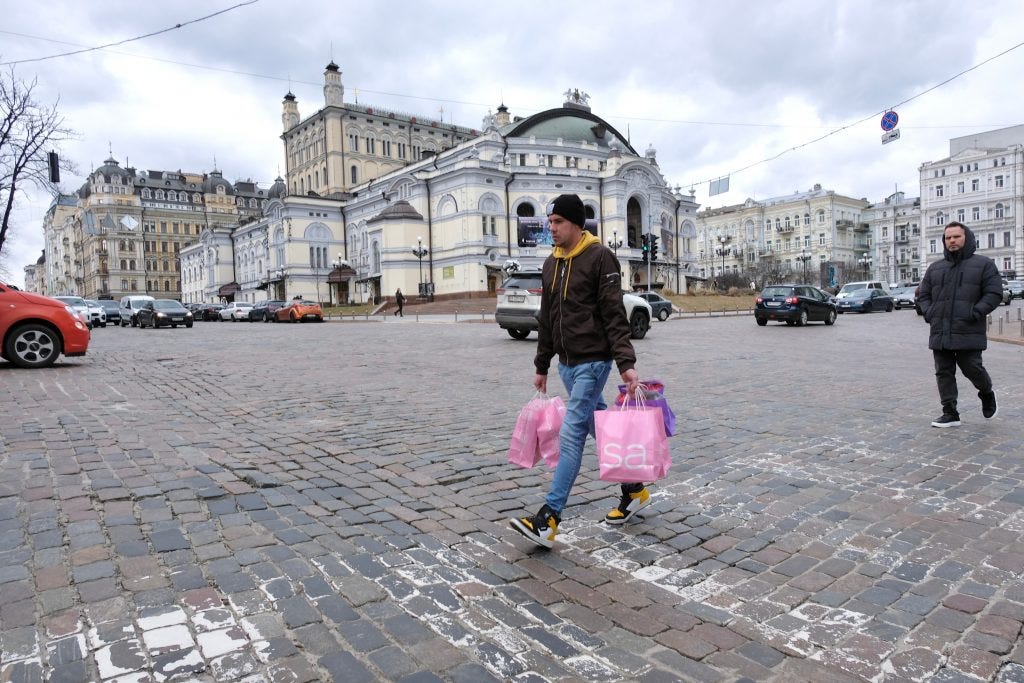All wars must end, but how to negotiate peace in Ukraine?
Cesar Jaramillo suggests a way to stop the carnage
Sadly, the prospect of an end of the war in Ukraine seems as far away as ever. All sides are digging-in, and the rhetoric of political leaders may box them into positions where they can not agree to peace talks (which will have to come eventually).
Last week’s Angus Reid Institute poll showed how little the public supports negotiations, despite many good people among our PeaceQuest community who support peace.
That’s why I want to share with you this thoughtful and urgently-needed articulation by our friend Cesar Jaramillo on the path toward a negotiated settlement.
A negotiated settlement is the only path to peace in Ukraine
By Cesar Jaramillo - Contributed to The Globe And Mail
With Ukraine’s successes in beating back Russia’s invasion thus far, the call for a decisive military win has permeated society, including governments, prominent media outlets and academia. In some sectors, calling for a peaceful settlement has become a fringe position, while support for further militarization hardens. But while it may be a hard pill to swallow for some, the most realistic endgame involves a negotiated settlement. The dogged pursuit of an ill-defined “win” for either Russia or Ukraine will not only prolong the war and increase human suffering – it will heighten the risk that nuclear weapons will be used.
Russia has made well-documented threats to use nuclear weapons in Ukraine. While such threats are unacceptable and demand global condemnation, their being spoken did not create the risk. The risk exists because the weapons exist, justified by a perilous doctrine of nuclear deterrence. This doctrine has been sustained and perpetuated by all states with nuclear weapons, including those now denouncing Russia’s nuclear bravado.
Indeed, key stakeholders in the conflict – including Russia, the United States and other nuclear-armed NATO members – possess more than 95 per cent of the world’s nuclear weapons. Despite differences in policy and ideology, all states with nuclear weapons ultimately share the belief that, under certain circumstances, they would be justified in considering their use.
A crushing defeat in its most ambitious military operation in more than seven decades would very likely be viewed by Russia as a threat to its vital interests, and by President Vladimir Putin – who has explicitly framed the war as an existential struggle with the West – as a fatal blemish on his legacy. Such circumstances would be dangerously consistent with known Russian policy around its use of nuclear weapons.
So the question is not just whether Mr. Putin would succumb to a humiliating defeat with a nuclear arsenal at his disposal – it’s also whether this is a gamble the world is willing to take.

While the provision of military aid by the West – NATO in particular – has been critical in bolstering Ukraine’s ability to resist Russian aggression, and may strengthen its hand at eventual peace negotiations, the increasing deployment of arms will neither win the war nor resolve its underlying causes. Further militarization could significantly undermine the prospects for a negotiated settlement and continue the cycle of violence and destruction, with no end in sight. Tens of thousands have already perished; how many more could die if this happens? And how much higher would the risk of nuclear escalation be?
A negotiated settlement would not be capitulation, nor a sign of weakness, and agreeing to negotiations would not bind any party to a particular outcome. Rather, negotiations would be a first step in finding common ground and possible solutions.
Points of disagreement include the status of the regions claimed and illegally annexed by Russia – both Crimea in 2014 and the Donbas region in the latest incursion – and Ukraine’s prospective NATO membership. Other thorny issues have arisen from the armed conflict itself, including questions of accountability, breaches of international law and war crimes. Unilateral concessions will not be on the table, so compromise will be required.
The nature of the NATO-Russia security relationship will be a key factor in any negotiated settlement.
Cesar Jaramillo
The nature of the NATO-Russia security relationship will be a key factor in any negotiated settlement. Since 1999, more than a dozen Eastern European states, including former Soviet republics, have joined NATO. And while NATO expansion does not justify Russia’s illegal and destabilizing aggression in Ukraine, it is impossible to deny that it has been a known irritant for Moscow. Security assurances that minimize Russia’s real or perceived vulnerability to NATO forces in the region would need to be part of a negotiation. Central to this issue is Ukraine’s prospective membership in the alliance, which is a known red line for the Kremlin.
Critically, for a negotiated settlement to become a viable alternative, there must first be broad recognition, at high political levels, that this is the desired goal. Thus far, however, that is not the case.
A negotiated settlement is a sensible and realistic approach to ending the war. Efforts to stop the carnage would not constitute a surrendering of principles, but a triumph for humanity, diplomacy and pragmatism. It is high time to end the war in Ukraine.
Cesar Jaramillo is executive director of Project Ploughshares and chair of the Canadian Pugwash Group.


